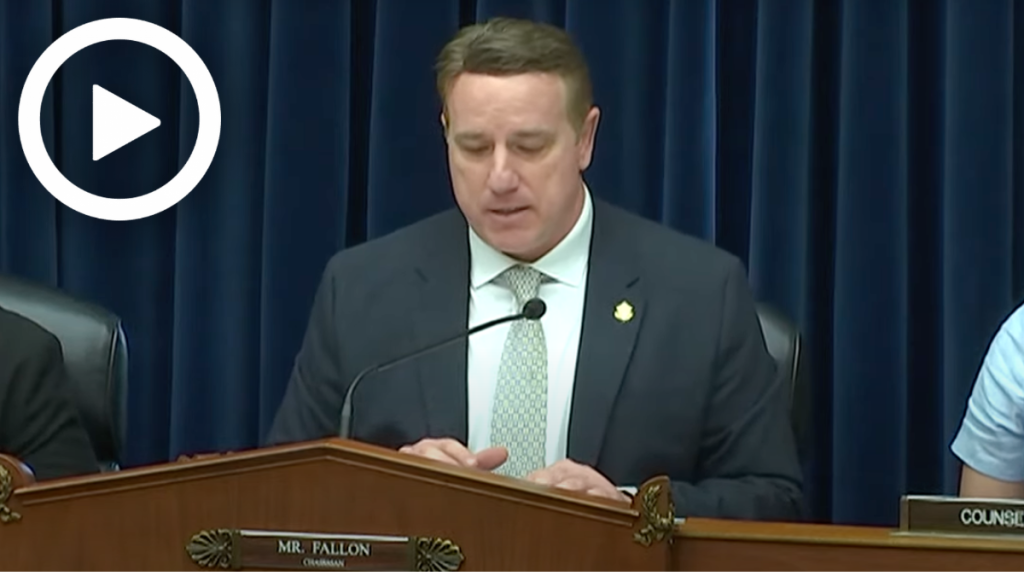Fallon: Increasing Domestic Mineral Mining Will Support our Economy and Protect Against Supply Chain Shortages
WASHINGTON—Subcommittee on Economic Growth, Energy Policy, and Regulatory Affairs Chairman Pat Fallon (R-Texas) delivered opening remarks at today’s hearing titled “Digger Deeper: Ensuring Safety and Security in the Critical Mineral Supply Chain.” Subcommittee Chairman Fallon emphasized how the Biden Administration’s overreliance on foreign critical minerals – including from Russia and China – is a national security risk and places the U.S. economy in a vulnerable position amidst worsening global supply shortages.
Below are Subcommittee Chairman Fallon’s remarks as prepared for delivery.
Welcome to today’s hearing before the Subcommittee on Economic Growth, Energy Policy, and Regulatory Affairs.
Today’s hearing examines another aspect of American energy independence—access to critical minerals and materials.
Critical minerals and materials are the building blocks of the products we rely on every day.
What are critical minerals and materials? They are the minerals that are those “essential to the economic and national security of the United States.”
Our witnesses today are from the Department of the Interior, Department of Energy, and Department of Defense—agencies who have significant equities and regulatory authorities in this space.
Since this is a cross-agency issue, I believe a cross-agency discussion is a necessary step in resolving present and potential vulnerabilities regarding our access to these essential materials.
Although other Committees have had recent hearings looking into this important topic, here on the Oversight Committee, we have a unique opportunity to cut through jurisdictional lines and look at the entire picture of the critical mineral and material supply chain—including how these elements impact national security—with each of the agencies represented at the witness table today.
While the Department of the Interior, the Department of Energy, and the Department of Defense all have slightly differing definitions for these important elements, each of these agencies are crucial players in the U.S.’s ability to procure and utilize critical minerals.
From graphite and lithium in mobile phone batteries, to aluminum in wind turbines, cobalt in electric vehicles and nickel in jet engines, critical minerals are fundamental to the American economy and national security.
However, the United States only produces 14 of the 50 critical minerals.
That means we have to rely on foreign nations to extract, refine, process, and export to us the large majority of these vital materials.
Following President Biden’s Executive Order 14017, the Administration reviewed the American critical mineral supply chain. It determined that “Currently, the United States has limited raw material production capacity and virtually no processing capacity. Without processing capacity, the United States exports the limited raw materials produced today to foreign markets….”
Unfortunately, China dominates the global supply chain, controlling 60 percent of production, an estimated 90 percent of processing, and over 75 percent of manufacturing of critical minerals.
What China cannot extract from within its own borders it secures access to internationally through aggressive investments.
For example, Chinese companies either own or finance 15 out of the 19 cobalt mines in the Democratic Republic of the Congo, a process that largely exploits child labor.
Further, the renewable energy sector is driving up demand for these minerals. The International Energy Agency estimates that critical mineral demand from EVs and battery storage necessary for renewable energy could increase 40 times by 2040.
Meanwhile, agencies are failing to create policy that is transparent and efficient for private-sector industries.
In one such instance, the Biden Administration stalled the Twin Metals Project in Minnesota, which would have tapped 95 percent of domestic nickel and 88 percent of domestic cobalt reserves—a decision at odds with its aggressive agenda to subsidize renewable energy projects dependent on these same materials.
Despite the Biden Administration’s lofty goals for renewable energy installation and electric vehicle adoption driving critical mineral demand, the domestic mining industry faces extreme hurdles.
Biden Administration red tape causes mining permits to take an average of seven to ten years in the U.S—a process that Canada and Australia manage in two to three, with similar environmental standards to the U.S.
Additionally, the various categories of critical minerals and materials—including how they are defined by U.S. agencies—affect the speed and quality of domestic production.
Increasing domestic mineral mining, processing, and refinement would fortify our economy and military and ensure these essential materials are made free of humanitarian abuse and greater environmental risk.
I’d like to thank all of our witnesses for appearing here today. I hope we can have a fruitful discussion on the importance of domestically extracting and processing critical minerals and the benefits that would have for Americans by creating jobs and securing our supply chains.
